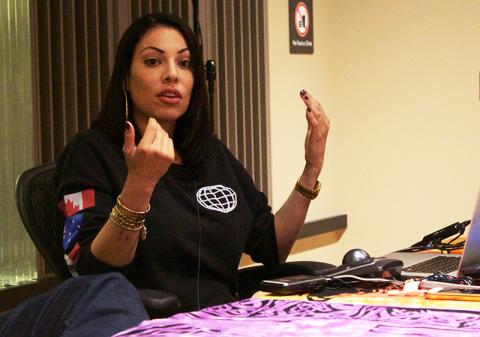Marcella Araica Advises Students on the Art of the Mix

Mixing engineer Marcella Araica delivers a clinic for students at Berklee's Shames Family Scoring Stage on Friday, April 7.
Image by Mike Keefe-Feldman
With mixing and/or composing credits for Usher, M.I.A., Meek Mill, Jason Derulo, and Britney Spears, among others, Marcella Araica spent last week talking with Berklee music production and engineering students on a range of issues and providing feedback on their mixes, culminating Friday in an open clinic at Berklee’s Shames Family Scoring Stage on what goes into the mindset of a successful mixing engineer.
“To be a mixing engineer is to be very patient, critical, and detail-oriented,” Araica told the students in attendance.
The clinic—moderated by Grammy-winning fellow mixing engineer Prince Charles Alexander, professor of music production and engineering, whose Critical Listening course received praise from Araica—offered students a chance to pepper Araica with technical questions on EQ, compression, frequencies, stems, and consoles. In the midst of all the technical concerns, Araica suggested that it was important for mixers not to fall into the trap of letting the technology take the place of ear training, and to remain aware of the music’s ultimate destination beyond industry doors.
“Don’t just stay in the studio with your mix,” Araica said. “Go to a pawn shop and buy a boom box from the ‘90s and see how it sounds there. Fancy speakers are for us, as engineers, but know that most people don’t have access to that."
"There are lots of fancy tools to help you see what’s happening, but work on your ears."
—Marcella Araica
While the clinic was aimed primarily at future producers and engineers, it also offered kernels of wisdom for performers. Jscott Martin, a performance-focused student, asked what he should be doing in the studio to help produce great results. Araica suggested that learning some basic mixing vocabulary can go a long way toward artists being able to convey their vision, while also noting that music can often convey what words cannot, so performers—who are often invested in ensuring that their music isn’t viewed as overly derivative—shouldn’t be afraid to reference other records or albums when trying to communicate a preferred sound.
The clinic included analysis of a song that Araica worked on, K. Michelle’s soulful “If It Ain’t Love.”
